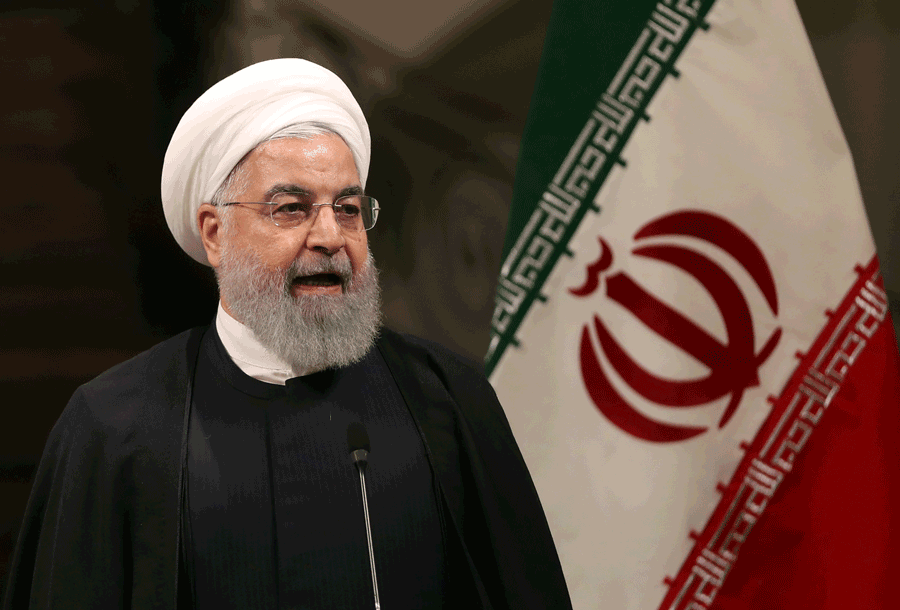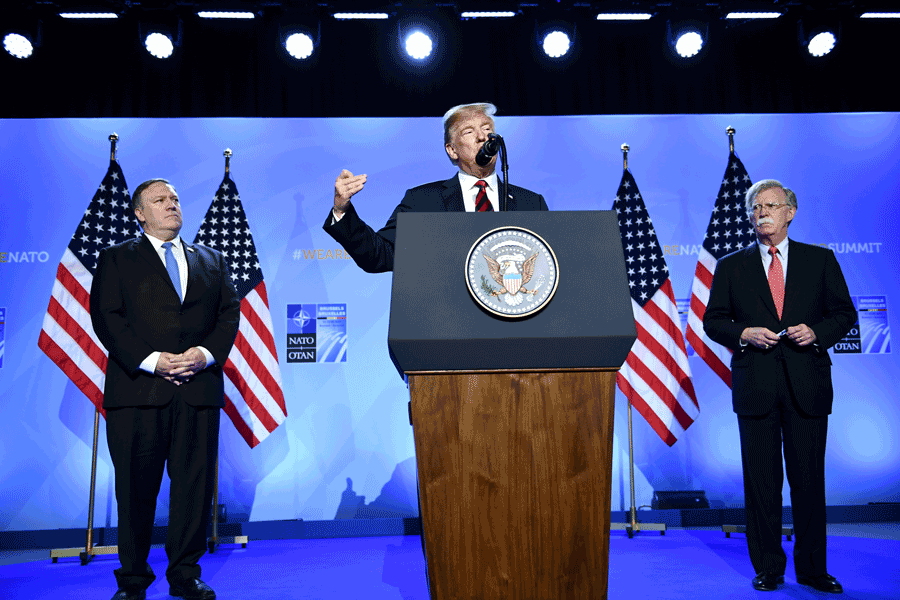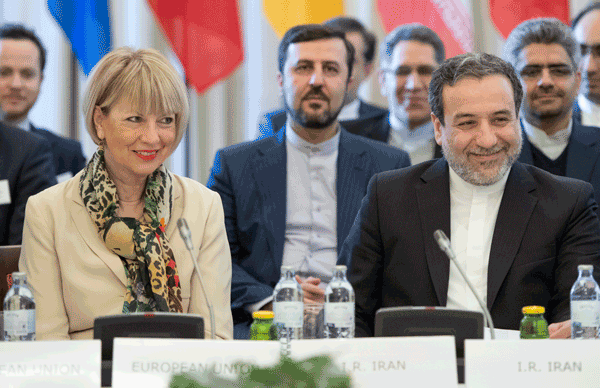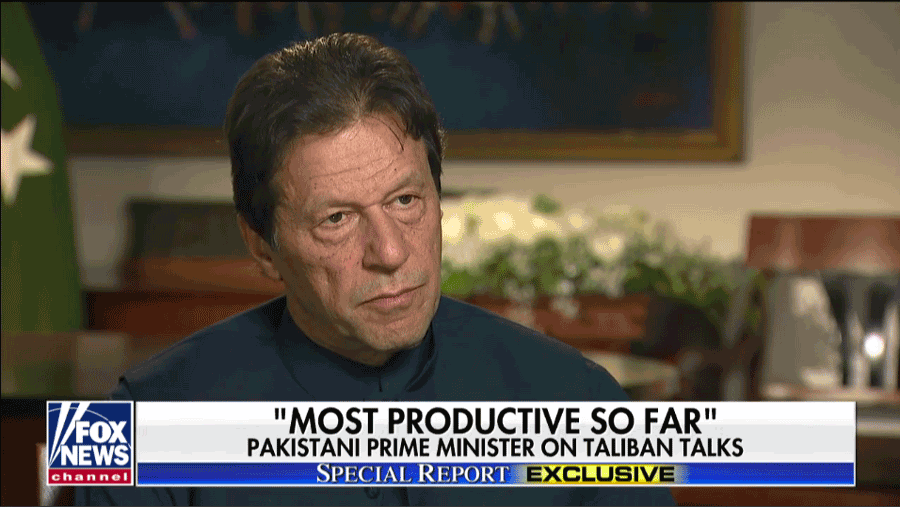Will Iran Capitulate or Counter?
By Huma Baqai | Newsbeat International | Published 6 years ago
“Never threaten an Iranian. Try respect – it works,” said the Iranian Foreign Minister, Mohammad Javad Zarif, in response to US President Donald Trump’s genocidal taunt in his tweet, saying, “If Iran wants to fight, that will be the official end of Iran. Never threaten the United States again.”

Relations between Washington and Tehran have been sliding downhill ever since Trump unilaterally pulled out of a landmark 2015 nuclear deal, officially known as the Joint Comprehensive Plan of Action (JCPOA). Iran was slapped with tough economic sanctions post the unilateral withdrawal which, many argue, has triggered a chain of events that could lead to a war and have far-reaching consequences across the globe – particularly in Europe and the Middle East.
Iran is being categorised by the West as the world’s most complex foreign relations dilemma. Since the 1979 Revolution, the West has had troubled relations with Iran. It nevertheless continues to be a very important country in the twenty-first century because of its resources, location, ideology, weaponry and allies, according to Robin Wright, a New York-based expert on Iran. The country holds 10 per cent of the world’s oil resources, it is the Organisation of Petroleum Exporting Countries’ (OPEC’s) second-largest oil producer and has the second-largest oil reserves and the third-largest gas reserves in the world, giving it enormous leverage in an energy-starved global community.
Iran’s geo-strategic location is also very significant; it is a bridge between the world’s most volatile blocs. Peaceful relations with Iran are a pre-requisite for stability in more than 12 countries, from the Middle East to the West, the Asian subcontinent to the east, and Central Asia and the Caucasus to the north. It is next to impossible to identify any country that actually benefits from the collision course Washington seeks to follow. Even Israel does not stand to benefit from it, as it could be the first target of Iranian retaliation.
For now, Israel is not at the centre of the front between the US and Iran. If such a military confrontation does happen, which currently seems unlikely, it will have indirect implications for Israel.
This is, presumably, the reason why nearly every conversation with a high-ranking military official in recent weeks began with the situation in the Gaza Strip, but quickly switched to events in the Gulf. Iran could use other arenas closer to Israel – Gaza, Lebanon, Syria – as diversions, or damage the interests of Washington and its allies in the region. That may have figured into the calculus behind the decision to end fighting with Hamas and Islamic Jihad, despite the deaths of four Israelis and the firing of 700 rockets into southern Israel.
The supporters of the deal agree that while the deal was not impeccable, it had all the deliverables. It subjected Iran’s nuclear programme to the most stringent verification regime in the history of arms control, ensuring that the country would not be able to develop nuclear weapons until at least 2030. It served the US’s objectives of preventing Iran from dominating the region and ensuring Israel’s security in the Middle East.
Trump condemned the landmark nuclear accord as being deficient and flawed for not being a permanent one, and for not covering Iran’s ballistic missile programme and its role in conflicts around the Middle East. Trump’s withdrawal from the deal could ignite a wider conflagration.
The Iranian officials are of the opinion that “elements” in the Trump administration (read John Bolton, the National Security Adviser and Mike Pompeo, the Secretary of State) are pushing for war between the US and Iran. This would be catastrophic for the Middle East.
After the US’s deployment of an aircraft carrier strike group, B-52 bombers and 1,500 more American troops, the fear of conflict in the Gulf region is becoming very real. Iran has also unveiled a new surface-to-air missile battery, Khordad 15, that resembles the Hawk missile that the US once sold to the Shah of Iran, Mohammad Reza Pahlavi. The Centre for Strategic and International Studies Missile Threat project describes Iran’s ballistic missile programme, as “the largest and most diverse missile arsenal in the Middle East.”
According to a report in The Washington Post, US war games have suggested that speedboat suicide attacks and missiles can be surprisingly effective against the American military. Iran’s Islamic Revolutionary Guard Corps, designated as a terrorist organisation by the US, has a navy component that is distinct from Iran’s regular navy; it focuses on smaller and faster, but still heavily armed vessels. It now has the responsibility to protect the Persian Gulf.
Amidst the sabre-rattling, the desire to re-engage remains on the table. Iranian President, Hassan Rouhani, signalled that talks with Washington might be possible, if sanctions were lifted. “Whenever they lift the unjust sanctions and fulfil their commitment and return to the negotiating table, which they left themselves, the door is not closed, but our people judge you by your actions, not your words,” he said in a statement to the press. This is an impactful signal because Khamenei has the final say in all major policies under Iran’s dual system, split between the clerical establishment and the government. He is also the head of the armed forces.
On the other hand, Trump too is hopeful that Iran will come to the negotiating table. In a conversation with Japanese Prime Minister Shinzo Abe in May 2019, he said, “I do believe Iran would like to talk and if they’d like to talk, we’ll talk also.” However, the narrative being peddled in the US after the imposition of sanctions, is that it cannot go to war with Iran and that the latter is not willing to negotiate.

Trump , Pompeo (L) and Bolton: Pushing for war with Iran.
The unilateral economic sanctions have impeded the flow of essential goods to the Iranian people and has made life in Iran very difficult. The rial has lost almost 60 per cent of its value against the dollar in the unofficial markets, ever since the US sanctions were reinstated. Inflation is high and incomes are falling in real terms.
President Rouhani compared the country’s economic distress under hardening US sanctions to the miseries Iran endured during its war with Iraq in the 1980s, but maintained, “Iran has no intention of capitulating.” Perhaps the Iranian strategy is, once again, to grit its teeth and work with a friendlier American president, post the 2020 elections. The American strategy is equally vague and hypothetical; the Secretary of State, Mike Pompeo, believes that the Trump administration’s strategy will not coerce Iranian leadership into a friendlier stance. Instead, he is hoping for a regime change.
Both the US and Iran are relying on fluid assumptions to achieve their ends: Iran on a change of president in the US and the US on a change of regime in Iran.
“From the Iranian perspective, the only thing that is more dangerous than suffering from sanctions is surrendering to the United States,” said Ali Vaez, Director of the Iran project at the International Crisis Group. Mohammad El Baradei, the former director of the International Atomic Energy Agency (IAEA), summed it up correctly when he said, “Iran is no donkey to be managed by carrots and sticks. It is a defiant regional power that demands a US U-turn on sanctions, an apology, and respect.”
Iran is playing its cards smartly. Rouhani announced that Iran would restart the production of nuclear centrifuges and begin accumulating nuclear material again. He also gave the European leaders a deadline of 60 days, that ends on July 7, 2019, to find ways to lift the financial pressure on Iran, forcing them to choose between siding with the US in isolating Iran and preserving the 2015 deal.
Pompeo’s recent statement, that “the US is prepared to engage with Iran without pre-conditions about its nuclear programme, but needs to see the country behaving like a normal nation,” was called by Iran as “word-play.” Rouhani said that the US could have returned to the negotiating table and resumed compliance with the 2015 deal. In addition, Iranian foreign ministry spokesman, Abbas Mousavi, said, “the Islamic Republic of Iran does not pay attention to word-play and expression of hidden agenda in new forms.”
Rouhani, viewed as a moderate by many, is sounding more and more like a hardliner; the million-dollar question is, will Iran hold-off or capitulate?
The answer depends on the stance the European Union (EU), Russia and China take on the issue.

Committed to the nuclear deal: Abbas Araghchi (R), political deputy at Iran’s Ministry of Foreign Affairs, and the Secretary General of the European Union’s External Action Service (EEAS) Helga Schmid in a meeting of the Joint Commission of the Joint Comprehensive Plan of Action (JCPOA) in Vienna.
While the EU has offered to support companies that are trading with Iran, will these organisations take the risk of being hit by secondary sanctions that will limit their ability to trade with the US? Nobody seems to have an answer to this. The US’s dominance of global trade remains a challenge; the announcement triggered a wave of international companies pulling their investment out of Iran and its crude oil exports have been falling.
The countries within the EU believe Iran is complying with its part of the nuclear deal and have made clear their intention not to follow America’s lead. On the other hand, the EU has also rejected the Iranian ultimatum, but remains committed to the multilateral pact, and the diplomatic option.
Though the White House accuses Europe of aiding Iran by sticking to the 2015 nuclear deal and preventing the negotiation of a different deal, Iran insists that Europe is not doing enough to save the agreement. The schism between the US and Europe over Iran, bears the hallmark of their friction over Iraq prior to the 2003 US-led invasion. Their current dispute is mainly over the means and not the ends, but it could have major implications for transatlantic relations as well as the Middle East, and may be far more dangerous than the invasion of Iraq.
German Foreign Minister, Heiko Mass, in a recent unscheduled visit to the Middle East to hold talks with Iraqi Prime Minister, Adil Abdul-Mahdi, over rising tensions between Iran and the US, said, “There is a clear danger of miscalculations, misunderstandings, provocations, leading to unforeseeable consequences in this highly tense region. The latest escalation requires us as European neighbours to intervene in favour of de-escalation and peaceful co-existence.” He added, “We Europeans are convinced that it is worth every effort to work towards upholding the Vienna Nuclear Agreement with Iran.”
The US invasion of Iraq in 2003 gave China a two-decade-long period of “strategic opportunity” to improve its relative power, while the US squandered its strength. Now, America may be on the brink of making the same mistake again, but on a much grander scale, as Iran is a different ballgame altogether.
In terms of conventional military strength, it may be far weaker than the US, but its ability to use asymmetric strategies against the enemy could allow it to inflict serious damage to US interests in the region. Iran’s Revolutionary Guards’ external special operations arm, known as the Quds Force, has contributed in building proxy forces in Iraq, Lebanon and Syria. It also funds militias like Hezbollah, which is a force in its own right.
Keeping in mind that Iran is three times the size and population of Iraq, and that its military forces are far more formidable, a war with the country would be a mistake. At best, a military engagement could take the shape of a short conflict, resulting in a soft-power disaster that damages the US’s international standing. But it is more likely that a potential conflict would quickly become a new quagmire that will make US involvement in Iraq and Afghanistan look simple by comparison.
There is a security convergence between Russia and Iran to counter the US-led order. Moscow may gain financially from a politically isolated and an economically weak Iran, but the geopolitical fallout of a regime change in Tehran will significantly outweigh the potential benefits.
There is an Iran-Russia convergence on Middle East policy. Both Russia and Iran wish to curb American influence in the Middle East. The Iranian proxies seem to have undermined the Sunni-Arab dominance of the region, which is backed by the US. While Iran builds military bases in Syria, Russia has used Iranian airbases to conduct the bombing campaigns that preserved the rule of its long-time client, Bashar al-Assad. The fall of Iran has direct implications for Moscow as it will cripple Russia’s policy in Syria, giving the US a free hand in getting rid of Assad.
China has come out in the open and supported Iran. Top Chinese diplomats assured Zarif, that China opposes unilateral sanctions and supports Tehran’s efforts to safeguards its interest. Chinese Foreign Minister Wang Yi called it a contest between multilateralism and unilateralism.
While China appreciates Iran’s implementation of the nuclear deal and its intentions to stick to it, it will look to balance relations between Tehran and Saudi Arabia. Chinese and Russian views and positions on Iran’s nuclear issues are aligned. China has been angered by US threats against countries and companies that violate US sanctions by importing Iranian oil. Chinese President, Xi Jinping, in his recent visit to Russia, did not directly address the oil sanctions issue, but appeared to allude to them by saying “China will continue firmly to safeguard its own legitimate and lawful rights and interests.”
The alliance between the US, Saudi Arabia and Israel, does not serve US objectives. Tel Aviv and Riyadh have no real interest in engaging Iran. US allies such as India and Afghanistan will also suffer from Washington’s tough policy on Iran. An isolated, economically crippled and defiant Iran can pose a serious obstacle to world peace.
Afghanistan, whose economy relies largely on remittances flowing in from Iran (68 per cent), will also be affected. According to the United Nations High Commissioner for Refugees (UNHCR) report, Iran is home to three million Afghan refugees, who will also suffer. Iran’s currency, the rial, has depreciated in comparison to the afghani and is at record lows against the US dollar, which is widely used in Afghanistan.

Imran Khan in an exclusive interview with Fox News during his trip to the US, on July 22.
Besides economic repercussions, sanctions on Iran are also one of the biggest impediments to the peace initiative in Afghanistan. The presence of NATO and the International Security Assistance Force (ISAF) has already restricted Iran’s contribution to Afghanistan, leaving little room for defence cooperation between Iran and Afghanistan. In fact, the deteriorating relationship between the US and Iran has downplayed Iran’s sunstantial peace-building potential in Afghanistan.
Tehran is of strategic importance to New Delhi owing to joint projects such as Chabahar, into which India has invested $500 million, but the sanctions have delayed the development of the port. The American objective of curtailing China and Pakistan’s influence in Afghanistan is facilitated by the strategic convergence between Tehran and New Delhi. American sanctions and confrontations only dilute the potential of this alliance.
Moreover, Iran and India are major trade partners. Iran has been a major supplier of crude oil to India for the last decade. On the other hand, Iran is also a consumer of Indian products. According to the Solvent Extractors Association (SEA) of India, the export of oil meal, used as animal feed, dropped 78 per cent, as trade with Iran dwindled due to the sanctions. The export of soybean and rice bran have also declined. India is trying to find alternatives.
India and Iran had a velvet divorce when the former aligned itself with Washington. However, Tehran continues to remain a strategically important capital for New Delhi.
As for Pakistan, not only is US pressure on Iran burdensome, it endangers Washington’s own interests. The deepening Washington-Tehran tensions and the risk of confrontation make it difficult for Pakistan to maintain a position of neutrality in the Tehran-Riyadh dispute. Riyadh, enjoying a revival in its friendship with Pakistan after its gift of $3 billion, could pressure Pakistan to side with it in an unfolding US-Iran crisis. Prime Minister Imran Khan and Foreign Minister Shah Mehmood Qureshi have expressed a desire to remain neutral in the Saudi-Iranian rivalry. Moreover, if Pakistan is pressurised into taking sides, the US-Iran-Pakistan troika may become explosive again. Historically, Pakistan has sustained this pressure well; it never formally took sides in the Iran-Iraq war and more recently, resisted getting dragged into the war in Yemen.
Washington’s Tehran policy may also pose problems for Pakistan’s energy security. Nearly 90 per cent of Pakistan’s energy needs are dependent on crude oil and petroleum products imported from the Middle East. The US sanctions regime can hinder Pakistan’s acquisition of hydrocarbons from a global supplier of energy resources. It will also impede the progress of the much-needed Iran-Pakistan (IP) gas pipeline, because the functioning of the multi-billion-dollar project is hostage to US sanctions. The IP gas pipeline project is virtually shelved now because of the re-imposition of sanctions on Iran. Countries like Pakistan, India and Afghanistan face the risk of being caught in the US-Iran crossfire.
According to a public opinion poll published by Reuters in May 2019, 51 per cent of Americans believe that the US will go to war with Iran, “within the next few years.” However, 49 per cent of them disapprove of Trump’s handling of relations with Iran, while 39 per cent approve it.
De-escalation will be difficult for US and Iran. Trump claims to have a new nuclear negotiation plan, which Iran has categorically rejected. There is a severe trust deficit between the two countries. Additionally, the Iranian stance is largely supported by European states, as well as China and Russia.
Is war really an option? Using the threat of war to pressurise Iran is a very risky strategy. Even the US’s closest allies find it difficult to support Trump’s tirade. Iran is angry and defiant; it has the quiet support of Russia and China and is pursuing an aggressive line of diplomacy, cultivating both friends and foes.
Huma Baqai is the Associate Dean, Institute of Business Administration (IBA), Karachi.


